高中英语教案(外研版选修8)
- 格式:doc
- 大小:308.50 KB
- 文档页数:59
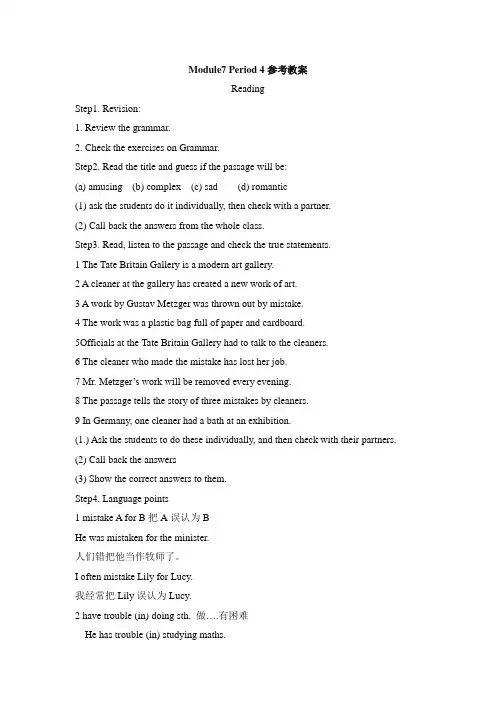
Module7 Period 4参考教案ReadingStep1. Revision:1. Review the grammar.2. Check the exercises on Grammar.Step2. Read the title and guess if the passage will be:(a) amusing (b) complex (c) sad (d) romantic(1) ask the students do it individually, then check with a partner.(2) Call back the answers from the whole class.Step3. Read, listen to the passage and check the true statements.1 The Tate Britain Gallery is a modern art gallery.2 A cleaner at the gallery has created a new work of art.3 A work by Gustav Metzger was thrown out by mistake.4 The work was a plastic bag full of paper and cardboard.5Officials at the Tate Britain Gallery had to talk to the cleaners.6 The cleaner who made the mistake has lost her job.7 Mr. Metzger’s work will be re moved every evening.8 The passage tells the story of three mistakes by cleaners.9 In Germany, one cleaner had a bath at an exhibition.(1.) Ask the students to do these individually, and then check with their partners.(2) Call back the answers(3) Show the correct answers to them.Step4. Language points1 mistake A for B把A误认为BHe was mistaken for the minister.人们错把他当作牧师了。
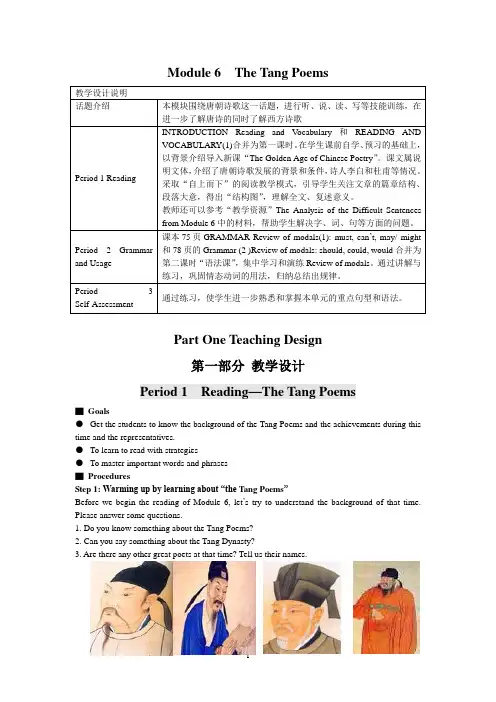
Module 6 The Tang PoemsPart One Teaching Design第一部分教学设计Period 1 Reading—The Tang Poems▇Goals●Get the students to know the background of the Tang Poems and the achievements during this time and the representatives.●To learn to read with strategies●To master important words and phrases▇ProceduresStep 1: Warming up by learning about “the Tang Poems”Before we begin the reading of Module 6, let’s try to understand the background of that time. Please answer some questions.1. Do you know something about the Tang Poems?2. Can you say something about the Tang Dynasty?3. Are there any other great poets at that time? Tell us their names.Li Bai Du Fu Bai Juyi Wang Wei4. What do you think are the influences of the Tang Poems?The Tang Dynasty was one of the great dynasties in Chinese history. In this period, there was a rapid development in politics, economy and culture, especially in Tang Poems. There appeared many great poets and created excellent works.Step 2: Before you readPlease introduce the words for this module, paying attention to the pronunciation of the words, the relationship between their pronunciation and spelling.Practice for words study:Have a spelling quiz. Read every sentence and fill the blanks with proper forms of the words in this module.1) A description of something that uses languages____.2) A ____is a person who trades with others by selling.3) Get out of your ____and you can pick yourself up.2. A diagram of The Tang Poems3. Complete the article with one word in each blankTrade with foreign countries created a 1___ and 2___culture. Persians, Arabs and Jews came to live in Chinese towns, bringing with them their own 3___ and customs. They were allowed to live in communities 4___by their own laws, and to keep their traditional forms of 5___such as music and dance, which influenced the development of Tang culture. But perhaps the biggest foreign influence came from 6___, whose 7___were in India. At the same time foreigners who were educated at the Tang 8___ took the Chinese culture home with them. Soon Japan and Korea were4. Determine the following state is Fact or Opinion1) It was a time of expansion.2) Trade with foreign countries created a tolerant and cosmopolitan culture.3) Perhaps the biggest foreign influence came from Buddhism.4) New discoveries were made in astronomy, geography and medicine.5) Li Bai, the son of a wealthy merchant, grew up in Sichuan Province.Step 4: After you read1. Copy all the useful expressions into your Expression Book and make your own sentences withstyles---realism and romantic. Also, some works connected realism and romantic.Period 2 Grammar and Usage—Review of modals ▇Goals●To review models (1): must, can’t, may /might; (2) should, could, would, etc▇ProceduresStep 1: Models插入人教试验3、4Step 2: Review the usage of models+ have done1.can +have done “(过去)可能/也许”,表示对过去发生行为的推测,常用于否定句和疑问句中. He can’t have been there. 他不可能到过那里.Can they have completed their work so soon? 这项工作他们竟会完成得这么快?Where can she have gone? 她可能到哪儿去了呢?2.could + have done有两个意思,须根据上下文判断.1)意思和用法同can +have done, 只是语气更委婉.He coul dn’t have made a mistake.他不可能弄错.She couldn’t have gone bad that far.她不可能坏到如此地步.2)用于肯定句,意为:”(过去)本来可能/也许”(而实际上未做),表虚拟.I could have come yesterday.我昨天本可以来的. (其实没有)You could have made greater progress.你的进步本来可能更大些.(事实并非如此)3.may + have done意为”(过去)可能/也许”,同can +have done,不过要用于肯定句和否定句中.You may have read about it in the papers.你可能已在报上看到这个消息了.He may not have got our telegram.他可能没有收到我们的电报.4.might +have done 也有两个意思,须根据句意或上下文判断.(1) 意思和用法同may + have done,不过might表示的可能性更小,语气更加委婉.You might have got inspiration from these words.或许你已经从这些话中得到了启示.He might not have gone home, he might have gone somewhere else.他也许没回家,或许到别的地方.(2)用于肯定句, 意为:”(过去)本来可能发生可以”,表虚拟.He might have gone, but preferred to remain.他本来可以去的,但他宁愿留下来。
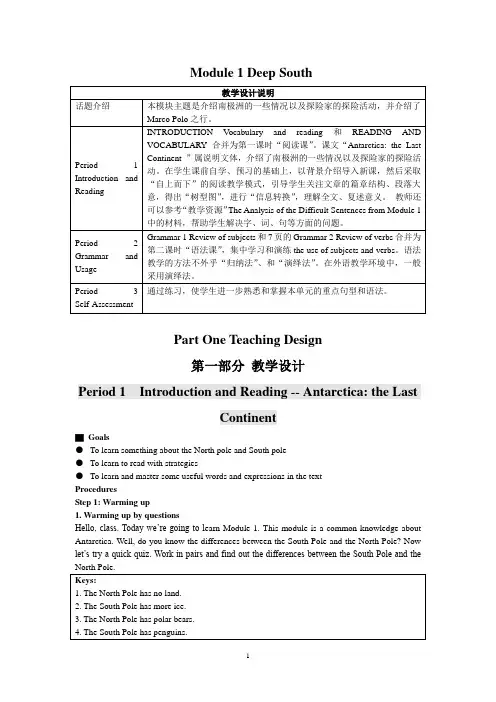
Module 1 Deep SouthPart One Teaching Design第一部分教学设计Period 1 Introduction and Reading -- Antarctica: the LastContinent▇Goals●To learn something about the North pole and South pole●To learn to read with strategies●To learn and master some useful words and expressions in the textProceduresStep 1: Warming up1. Warming up by questionsHello, class. Today we’re going to l earn Module 1. This module is a common knowledge about Antarctica. Well, do you know the differences between the South Pole and the North Pole? Now let’s try a quick quiz. Work in pairs and find out the differences between the South Pole and theBefore we read the text, we should firstly study some new words which appear in the passage.Spelling exercises1. Do you know the ______(一年的) course of the sun?2. The well is ten meters in d______.3. France made a peace t________ with a neighboring country.4. She left her purse on the table as a t_____ of the child’s honesty.5. The house was in a dirty _____(状况)6. The football team was ____(晋升) to the first division.Step 2: Reading1. Reading and find a heading for each paragraph1. Which of the following sentences is WRONG about Antarctica?A. Antarctica is not only the coldest place but also the driest place on earth.B. Antarctica is the fifth largest continent in the worldC. A high mountain range, the Trans-Antarctica range, cuts the continent in twoD. Antarctica holds 70% of the world’s ice and 90% of the world’s fresh water.2. Which of the following descriptions is RIGHT about the wild life in Antarctica?A. There are flying birds, seals, whales and one type of penguins.B. The long Antarctica winter night, the extreme cold and lack of rainfall make few types of penguins.C. There are some trees on the large continent.D. Only two types of flowering plants are found and no forms of algae can grow on ice.3. Antarctica rocks are very important for research because ______.A. the rock has become a window on the pastB. gases and minerals trapped in the rocks can tell us a lot about the weather in the pastC. most of the rocks are meteorites from outer spaceD. most Antarctica rocks are dark in color4. _________crossed the Antarctica Circle in the late 18th century.A. The British explored James CookB. The explorer called NorwegianC. The explorer called CarstensAntarctica is the coldest and driest place in the world. It is technically a _______. It _____ 90% of the world’s ice and most of its fresh water is in a frozen _______. In some places it reaches a ________ of five kilometers.The wildlife in Antarctica has ____ its extreme conditions, but few types of plants can survive there because of the long winter night, the extreme cold and _____ of rainfall.Researchers can get a lot of ________ from the ice, gases, minerals and rocks there. Rocks in dark color which ______ ______ against the white are easy to find and collect.In 1895, a Norwegian called Carstens Borchgrevink became the first man to ____ ___ _____ the Antarctica mainland. Today scientists from many countries travel to Antarctica to study its _________. A spirit of international friendship has replaced the _________. In 1961, 12 countries signed a ________, making Antarctica the world’s biggest nature reserve. Antarctica has becomeStep 4: After reading1. Why is Antarctica an important place?2. Do you think the Antarctica Treaty is a good idea? Why / Why not?3. What might happen to Antarctica if t here wasn’t an international treaty to protect it?4. What other international treaties do you know about ?5. What other international treaties do you think the world needs?Period 2 Grammar and Usage -- Review of subjectsGoalsTo review and master the use of subjects and verbsProceduresStep 1: Review subjects1.主语的定义:主语是一个句子所叙述的主体。
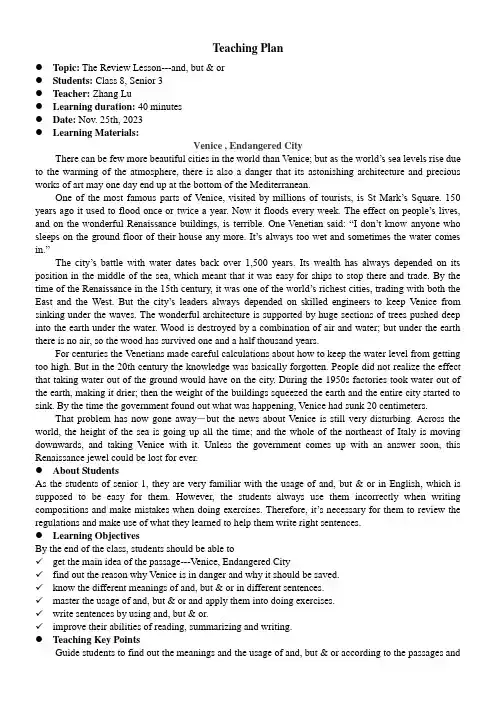
Teaching Plan●Topic: The Review Lesson---and, but & or●Students: Class 8, Senior 3●Teacher: Zhang Lu●Learning duration: 40 minutes●Date: Nov. 25th, 2023●Learning Materials:Venice , Endangered CityThere can be few more beautiful cities in the world than Venice; but as the world’s sea levels rise due to the warming of the atmosphere, there is also a danger that its astonishing architecture and precious works of art may one day end up at the bottom of the Mediterranean.One of the most famous parts of Venic e, visited by millions of tourists, is St Mark’s Square. 150 years ago it used to flood once or twice a year. Now it floods every week. The effect on people’s lives, and on the wonderful Renaissance buildings, is terrible. One Venetian said: “I don’t know anyone who sleeps on the ground floor of their house any more. It’s always too wet and sometimes the water comes in.”The city’s battle with water dates back over 1,500 years. Its wealth has always depended on its position in the middle of the sea, which meant that it was easy for ships to stop there and trade. By the time of the Renaissance in the 15th century, it was one of the world’s richest cities, trading with both the East and the West. But the city’s leaders always depended on skilled engineers to k eep Venice from sinking under the waves. The wonderful architecture is supported by huge sections of trees pushed deep into the earth under the water. Wood is destroyed by a combination of air and water; but under the earth there is no air, so the wood has survived one and a half thousand years.For centuries the Venetians made careful calculations about how to keep the water level from getting too high. But in the 20th century the knowledge was basically forgotten. People did not realize the effect that taking water out of the ground would have on the city. During the 1950s factories took water out of the earth, making it drier; then the weight of the buildings squeezed the earth and the entire city started to sink. By the time the government found out what was happening, Venice had sunk 20 centimeters.That problem has now gone away-but the news about Venice is still very disturbing. Across the world, the height of the sea is going up all the time; and the whole of the northeast of Italy is moving downwards, and taking Venice with it. Unless the government comes up with an answer soon, this Renaissance jewel could be lost for ever.●About StudentsAs the students of senior 1, they are very familiar with the usage of and, but & or in English, which is supposed to be easy for them. However, the students always use them incorrectly when writing compositions and make mistakes when doing exercises. Therefore, it’s necessary for them to review the regulations and make use of what they learned to help them write right sentences.●Learning ObjectivesBy the end of the class, students should be able to✓get the main idea of the passage---Venice, Endangered City✓find out the reason why Venice is in danger and why it should be saved.✓know the different meanings of and, but & or in different sentences.✓master the usage of and, but & or and apply them into doing exercises.✓write sentences by using and, but & or.✓improve their abilities of reading, summarizing and writing.●Teaching Key PointsGuide students to find out the meanings and the usage of and, but & or according to the passages andsentences.●Teaching DifficultiesEnable the students to use this language point correctly.Enable the students to a write short passage about Venice by using and, but & or.●Teaching MethodsTask-based approach; Communicative approach; Cooperative Learning●Teaching AidsMultimedia, chalks and a blackboard●Learning Procedures●Design of the Blackboard WritingThe Review Lesson and, but & orVeniceSea levelsthe warming of the atmosphere● Teaching Flow Chat。
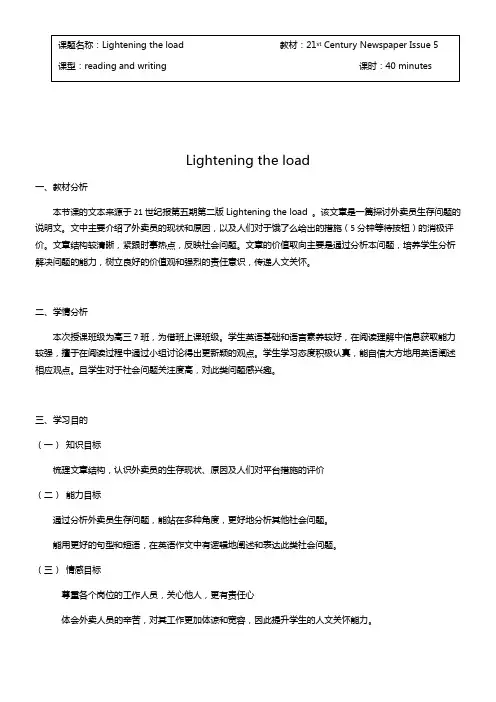
Lightening the load一、教材分析本节课的文本来源于21世纪报第五期第二版Lightening the load 。
该文章是一篇探讨外卖员生存问题的说明文。
文中主要介绍了外卖员的现状和原因,以及人们对于饿了么给出的措施(5分钟等待按钮)的消极评价。
文章结构较清晰,紧跟时事热点,反映社会问题。
文章的价值取向主要是通过分析本问题,培养学生分析解决问题的能力,树立良好的价值观和强烈的责任意识,传递人文关怀。
二、学情分析本次授课班级为高三7班,为借班上课班级。
学生英语基础和语言素养较好,在阅读理解中信息获取能力较强,擅于在阅读过程中通过小组讨论得出更新颖的观点。
学生学习态度积极认真,能自信大方地用英语阐述相应观点。
且学生对于社会问题关注度高,对此类问题感兴趣。
三、学习目的(一)知识目标梳理文章结构,认识外卖员的生存现状、原因及人们对平台措施的评价(二)能力目标通过分析外卖员生存问题,能站在多种角度,更好地分析其他社会问题。
能用更好的句型和短语,在英语作文中有逻辑地阐述和表达此类社会问题。
(三)情感目标尊重各个岗位的工作人员,关心他人,更有责任心体会外卖人员的辛苦,对其工作更加体谅和宽容,因此提升学生的人文关怀能力。
四、教学重点和难点●重点:探讨如何改善外卖人员的生存环境●难点:探讨社会问题并给出建议五、教学方法及手段●追问式教学法情景教学法任务型教学法●利用多媒体课件及黑板等手段六、教学过程七、板书设计Lightening the loadOpinions : Measures:illogical ; irresponsible improve algorithm(算法)and prasing systemnot the ultimate cure regulations on breaking traffic rulesUnfair;optimize the system insurance&welfare(福利)prohibit tight schedule。
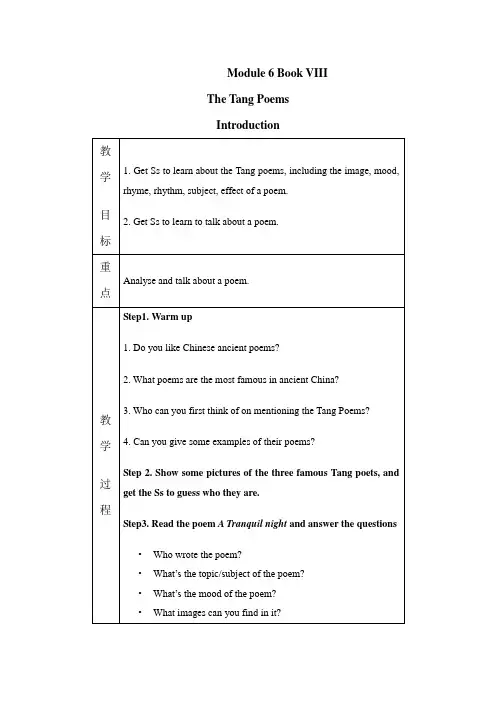
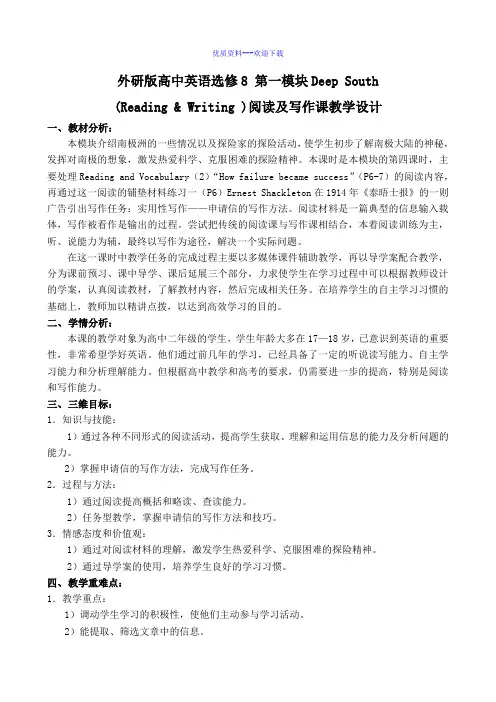
优质资料---欢迎下载外研版高中英语选修8 第一模块Deep South(Reading & Writing )阅读及写作课教学设计一、教材分析:本模块介绍南极洲的一些情况以及探险家的探险活动,使学生初步了解南极大陆的神秘,发挥对南极的想象,激发热爱科学、克服困难的探险精神。
本课时是本模块的第四课时,主要处理Reading and Vocabulary(2)“How failure became success”(P6-7)的阅读内容,再通过这一阅读的铺垫材料练习一(P6)Ernest Shackleton在1914年《泰晤士报》的一则广告引出写作任务:实用性写作——申请信的写作方法。
阅读材料是一篇典型的信息输入载体,写作被看作是输出的过程。
尝试把传统的阅读课与写作课相结合,本着阅读训练为主,听、说能力为辅,最终以写作为途径,解决一个实际问题。
在这一课时中教学任务的完成过程主要以多媒体课件辅助教学,再以导学案配合教学,分为课前预习、课中导学、课后延展三个部分,力求使学生在学习过程中可以根据教师设计的学案,认真阅读教材,了解教材内容,然后完成相关任务。
在培养学生的自主学习习惯的基础上,教师加以精讲点拨,以达到高效学习的目的。
二、学情分析:本课的教学对象为高中二年级的学生,学生年龄大多在17—18岁,已意识到英语的重要性,非常希望学好英语。
他们通过前几年的学习,已经具备了一定的听说读写能力、自主学习能力和分析理解能力。
但根据高中教学和高考的要求,仍需要进一步的提高,特别是阅读和写作能力。
三、三维目标:1.知识与技能:1)通过各种不同形式的阅读活动,提高学生获取、理解和运用信息的能力及分析问题的能力。
2)掌握申请信的写作方法,完成写作任务。
2.过程与方法:1)通过阅读提高概括和略读、查读能力。
2)任务型教学,掌握申请信的写作方法和技巧。
3.情感态度和价值观:1)通过对阅读材料的理解,激发学生热爱科学、克服困难的探险精神。
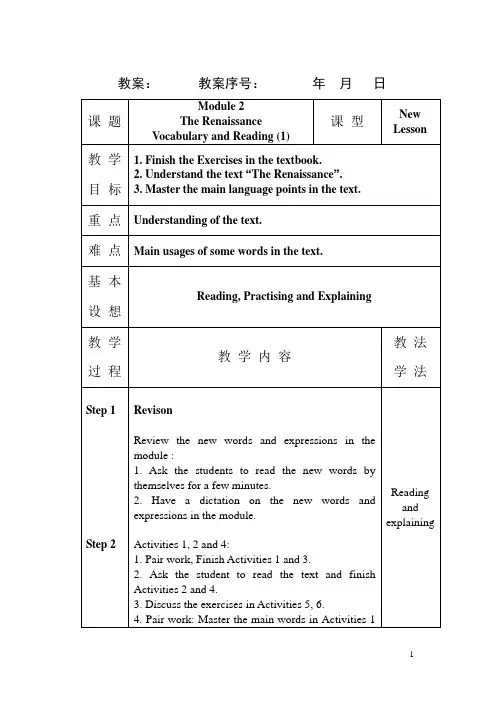
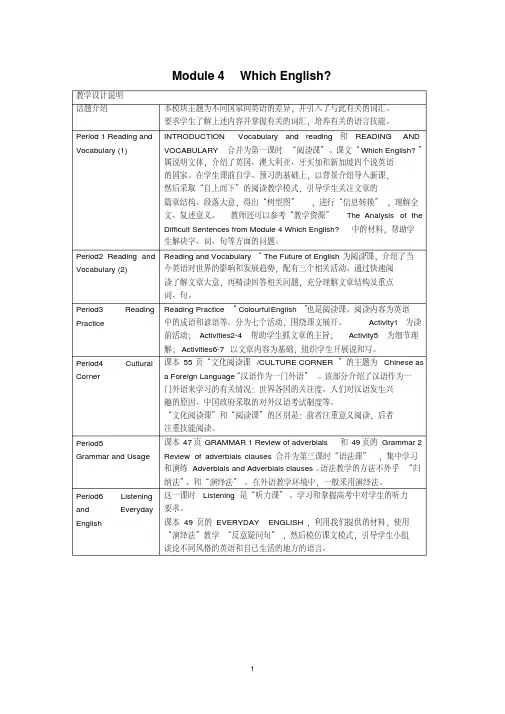
Module 4 Which English?教学设计说明话题介绍本模块主题为不同国家间英语的差异,并引入了与此有关的词汇。
要求学生了解上述内容并掌握有关的词汇,培养有关的语言技能。
Period 1 Reading and Vocabulary (1) INTRODUCTION Vocabulary and reading 和READING AND VOCABULARY合并为第一课时“阅读课”。
课文“Which English?”属说明文体,介绍了英国、澳大利亚、牙买加和新加坡四个说英语的国家。
在学生课前自学、预习的基础上,以背景介绍导入新课,然后采取“自上而下”的阅读教学模式,引导学生关注文章的篇章结构、段落大意,得出“树型图”,进行“信息转换”,理解全文、复述意义。
教师还可以参考“教学资源”The Analysis of the Difficult Sentences from Module 4 Which English?中的材料,帮助学生解决字、词、句等方面的问题。
Period2 Reading and Vocabulary (2) Reading and Vocabulary “The Future of English”为阅读课,介绍了当今英语对世界的影响和发展趋势,配有三个相关活动。
通过快速阅读了解文章大意,再精读回答相关问题,充分理解文章结构及重点词、句。
Period3 Reading Practice Reading Practice “Colourful E nglish” 也是阅读课。
阅读内容为英语中的成语和谚语等。
分为七个活动,围绕课文展开。
Activity1为读前活动;Activities2-4 帮助学生抓文章的主旨;Activity5为细节理解;Activities6-7以文章内容为基础,组织学生开展说和写。
Period4 Cultural Corner 课本55页“文化阅读课/CULTURE CORNER”的主题为Chinese as a Foreign Language“汉语作为一门外语”。
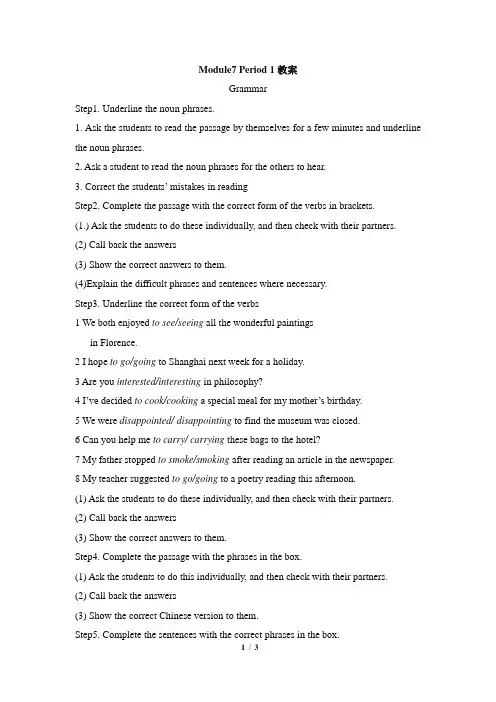
Module7 Period 1教案GrammarStep1. Underline the noun phrases.1. Ask the students to read the passage by themselves for a few minutes and underline the noun phrases.2. Ask a student to read the noun phrases for the others to hear.3. Correct the students’ mistakes in readingStep2. Complete the passage with the correct form of the verbs in brackets.(1.) Ask the students to do these individually, and then check with their partners.(2) Call back the answers(3) Show the correct answers to them.(4)Explain the difficult phrases and sentences where necessary.Step3. Underline the correct form of the verbs1 We both enjoyed to see/seeing all the wonderful paintingsin Florence.2 I hope to go/going to Shanghai next week for a holiday.3 Are you interested/interesting in philosophy?4 I’ve decided to cook/cooking a special meal for my mother’s birthday.5 We were disappointed/ disappointing to find the museum was closed.6 Can you help me to carry/ carrying these bags to the hotel?7 My father stopped to smoke/smoking after reading an article in the newspaper.8 My teacher suggested to go/going to a poetry reading this afternoon.(1) Ask the students to do these individually, and then check with their partners.(2) Call back the answers(3) Show the correct answers to them.Step4. Complete the passage with the phrases in the box.(1) Ask the students to do this individually, and then check with their partners.(2) Call back the answers(3) Show the correct Chinese version to them.Step5. Complete the sentences with the correct phrases in the box.1What happens ____________________?2 Einstein became an American citizen, but he was German______.3 She prepared the whole meal ___________.It was cooked and _____________in half an hour.4 Luckily you’ve arrived _____________for the ice cream.5 I could tell she was American_____________________.6 _____________________, Max was always one of the best students in his year.7 The taste and flavor of the food was somewhere ___________________________.8 ___________, I changed my mind about cold food-I really enjoy a fresh salad now.(1) Ask the students to do this individually, and then check with their partners.(2) Call back the answers(3) Show the correct Chinese version to them.Step6. Complete the sentences with the correct words.1 A student who/which was here yesterday must have left this book on the desk.2 Bai Juyi, that/who was born in 772, was one of the great Tang poets.3 The food which/whom they give us on the airplane was cold.4 Chinese food, which/that is very tasty, is well-known all over the world5 The dish who/which I ate yesterday was rather spicy.6 Saturn, whose/whom rings have always fascinated people, is a strange planet.7 The probe, which/who has already taken some wonder--ful photos, has another important job to do.8 She’s the girl whose/that cousin is in my class.(1.) Ask the students to do these individually, and then check with their partners.(2) Call back the answers(3) Show the correct answers to them.Step7. Choose the best way to complete the sentences(1.) Ask the students to do these individually, and then check with their partners.(2) Call back the answers(3) Show the correct answers to them.(4)If the students don’t understand the us age of the conjunctions, explain to them1 whatever即可引导状语从句,又可引导名词性从句。
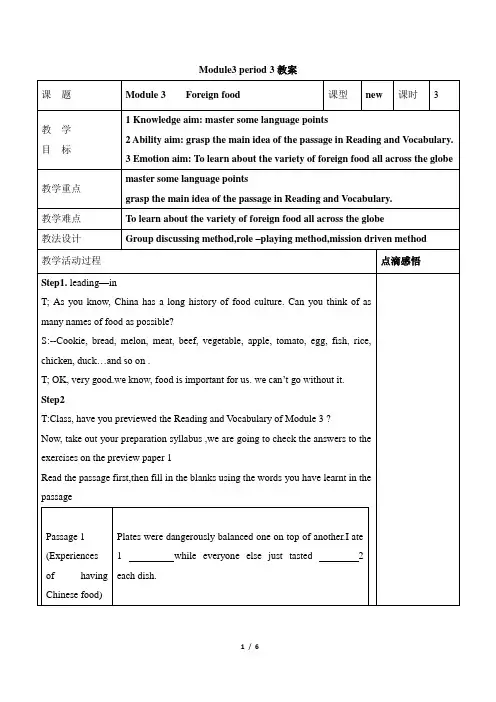
外研版高中英语选修8全册教案一、课程概述外研版高中英语选修8是高中英语课程的重要部分,旨在进一步提高和深化学生的英语语言能力。
本册教材涵盖了广泛的主题,包括科技、文化、社会问题等,通过深入探讨这些主题,教材帮助学生提升理解和表达能力。
二、教学目标1、增强学生的词汇量和语法知识,提高阅读理解和写作能力。
2、培养学生的英语口语表达和听力理解能力,能在日常生活中运用英语进行交流。
3、引导学生了解和欣赏英语语言的美,培养其对英语文化的理解和尊重。
三、教学内容及方法本册教材共分为六个单元,每个单元都有一个主题,包括"Body Language and Non-verbal Communication","Literature","Science and Technology","Society and Family","Culture"和"Travel"。
每个单元都包含了阅读、听力、口语练习、写作、语法学习等环节。
教学方法包括:1、激活学生的前知:通过提问和讨论的方式,了解学生对主题的熟悉程度和已有的知识。
2、教学策略:采用讲解、示范、小组讨论、角色扮演等多种教学方法,以提高学生的参与度和学习效果。
3、学生活动:组织学生进行小组讨论、角色扮演等活动,以增强他们的口语表达和听力理解能力。
4、评估与反馈:通过作业、测试和课堂表现等方式,评估学生的学习效果,并及时给予反馈和建议。
四、教学重点与难点教学重点包括:1、深入理解和探讨每个单元的主题。
2、提高学生的阅读理解和写作能力。
3、培养学生的英语口语表达和听力理解能力。
教学难点包括:1、帮助学生克服在英语表达中的语法和词汇障碍。
2、引导学生了解和欣赏英语语言的美,培养其对英语文化的理解和尊重。
3、通过多样化的教学活动激发学生的学习兴趣和积极性。
Module 1 Deep South I.模块教学目标III. 教材分析与教材重组1. 教材分析本模块以人类发现的最后一块大陆———南极洲为话题, 通过极地常识小测验、阅读介绍南极的科普文章、回顾人类历史上几次著名的南极探险旅行,使学生对南极的地理、气候、动植物及其对人类的重要意义,包括其研究价值和对全球的政治意义等方面有较全面的认识和了解,并能运用自己已有的自然知识和所学的语言技能,以南极洲为中心话题展开讨论。
另外,通过课文学习可使学生理解南极条约的重大意义并由此引出国际公约在全球保护自然资源方面(包括南极洲)所起的重要作用的话题的讨论。
1.1 INTRODUCTION 包括三个部分。
第一部分是一组关于南北极地理常识的小测验和两个“脑筋急转弯”小对话,新颖有趣。
第二部分设计了旨在让学生了解南极的几个小题目,鼓励学生发表自己的观点。
这项设计导向明确,为学生提供了发散思维的空间,同时自然引入第三部分:谈论去不去南极的原因。
各个部分衔接紧凑,环环相扣,趣味与知识相融合;既呈现了本模块的中心话题,又为下一步进行针对Antarctica这一话题展开的听、说、读、写训练打下基础。
1.2 READING AND VOCABULARY(1)包括一篇阅读课文和五项活动。
其中Activity 1是阅读材料五个段落中心含义的概括训练。
这一设计有两个目的:一是使学生在阅读前先了解阅读材料的大意并带着问题阅读;二是指导学生学习如何用最简洁明了的语言归纳段落大意。
Activity 2的任务是让学生在快速阅读之后依据课文判断所给信息的正误,旨在考查学生的快速阅读效果。
这两项活动的技巧性和实用性都很强,既能提高学生的阅读兴趣,又能训练学生的阅读技巧。
Activities 3 & 4是为使学生掌握课文中的重点词汇和短语而设计的,用于课文学习之后。
Activity 5则是为评价学生对课文的理解程度而设计的双人活动。
供阅读的课文是一篇题为“Antarctica: the Last Continent”的科普文章,介绍了有关南极洲这块人类最后发现的大陆各方面的情况。
Module1 Period Ⅵ教案Every day English & cultural cornerStep 1. Read the passage and answer the questions .(SB)Step 2. Decide True or False .1. Marco polo sets off alone on a 25-year journey to China.(F)2. The book about Marco polo’s travels was writte n by Marco Polo.(F)3. The book described the amazing things in china such as paper money andcoal.(T)4. Marco Polo’s book was a great influence for many future travelers .(T)Step 3. Language points .Everyday English1. keep up(1)keep sb up 使某人不能去睡觉I do hope we’re not keeping you up. 我希望我们没有耽误你睡觉。
(2)keep sth up 不让(精力等)衰退,维持,保持They sang songs to keep their morale up. 他们唱着歌以保持高昂的士气。
2. run: (指陈述、叙述等)有某样言词、内容等“Ten shot dead by gunmen”, ran the newspaper headline.报纸标题为“枪手击毙十人”。
I suppose it runs in the family. 我认为家庭的其他成员也有同样的爱好。
Points in cultural Corner1.Imagine a 17-year-old boy from Venice, ltaly, well-educated(受过良好教育的)and trained for life as a rich trader(被培养成一个富有的商人).2.He sets off(动身,出发)with his father and uncle on a 25-year journey to …On one’s journey /voyage to… 在某人去……的旅途中归纳:①on one’s way to /on the way to 在某人去某地的路上②make one’s way to … 向……走去③make/go on a voyage/journey from…to…由……航行前往……3.They befriend(对待……如朋友,与……成为朋友)one of the most powerful men on Earth, kubla khan.befriend.v.待人如友,对……尽朋友之道They befriended the young girl, providing her with food and shelter.他们热心地照顾这个年轻的姑娘,给她吃的,给她住处。
外研版高中英语选修8全册教案外研版高中英语选修8全册教案课程概述外研版高中英语选修8全册教材涵盖了广泛的主题和内容,包括文化、历史、科学、社会和个人发展等方面。
本教材旨在通过多种形式的阅读、口语、听力、写作和语法训练,提高学生的英语语言技能和交际能力。
教学目标1、知识与技能:学生应能够掌握本教材所涉及的语法、词汇、阅读和听力技巧,并能够运用这些知识进行有效的英语交际。
2、文化意识:学生应能够了解不同文化之间的差异,培养跨文化交流的意识,并对自己的文化进行反思和传承。
3、学习策略:学生应能够掌握自主学习的方法和技巧,如如何制定学习计划、如何评估自己的学习进度和成绩等。
4、情感态度:学生应能够形成积极的学习态度和价值观,培养对英语学习的兴趣和自我激励能力。
教学内容本教材共分为10个单元,每个单元都有一个主题,包括:1、Unit 1: Discovering useful words and expressions2、Unit 2: Understanding the meaning of words3、Unit 3: Discovering grammar: Conditionals4、Unit 4: Enjoying literature5、Unit 5: Understanding the world6、Unit 6: Discovering useful words and expressions7、Unit 7: Understanding the meaning of words8、Unit 8: Discovering grammar: Passives9、Unit 9: Enjoying literature10、Unit 10: Understanding the world教学方法1、课堂教学:通过讲解、演示、讨论和互动等方式,使学生掌握本教材所涉及的语法、词汇、阅读和听力技巧。
2、语言实践:通过对话、角色扮演、演讲、写作等活动,培养学生的英语口语和写作能力,同时增强学生的自信心和表达能力。
Module1 Period V教案Language points in reading practice1.…and a magnetic (磁的,磁场的) Pole which changes its position according to (随着)the movement of the earth.2.…the glare(强光)of the sunlight here is very intense(强烈的).glare n.①耀眼的光avoid the glare of the su n/the car’s head lights避开耀眼的阳光/汽车前行的强光The sunglasses are designed to reduce glare.这些太阳镜是为了减少刺眼的光而设计的。
The rabbit was caught in the glare of the car’s headlights.兔子在耀眼的汽车灯照射下动弹不得。
②怒视/凝视/恶狠狠的注视give sb a hostile glare 含故意地注视某人v. ①发出炫目而令人不快的强光The searchlight glared, illuminating (lighting up)the prison yard.按照打发出强光,照亮监狱场地。
The sun is glaring (down) mercilessly form a clear sky.透过晴空,太阳正毒。
②怒目而视,恶狠狠地盯视。
He didn’t shout; he just glared at me silently.他没有喊叫,只是默默地怒视着我。
I looked at her and she glared furiously back.我看了她一眼,她便怒不可遏地回瞪我。
3.It’s also reflected (反射)by the snow, so if you go outside, remember to wear sunglasses(戴上墨镜)and use suncream(防晒霜).Reflect v.1.反映,映出(影像)His face was reflected in the mirror. 他的脸映照在镜子里。
Module 1Deep South教学设计Period Ⅰ(第一节)Introduction & Reading and V ocabulary (1)教学目标:了解神秘的南极大陆。
教学重点:学习和初步运用有关词语,回答有关南极大陆的各种问题。
教学难点:通过阅读提高概括和略读、查读能力。
Step1: Lead-inIt is well-known to all that seven continents exist on the earth. Which one was the last continent to be discovered? (Antarctica)It is its unique natural features and scientific research value that attract interests of many tourists, explorers and scientists. As the exploration goes on, people know more and more about Antarctica. How much do you know about it? Ok, let’s have an Antarctic general knowledge quiz.①which month is the coldest month in Antarctica?(September, July, December )②Generally a penguin weighs about .(1 kg, 5 kg, 50 kg )③The China Great Wall Station was founded .(in 1985, in 1989)④The blood colour of fishes in Antarctica is .(brown, red, blue, white)⑤What is the southernmost point of The Earth?(the south pole /deep south)Opposite the south pole is the north pole. what are the similarities and differences between the north pole and the south pole?Let’s go on with the quick quiz.Step2: Introduction Activity 1Step3: Reading and V ocabulary (1)Since Antarctica is so fantastic, why not learn more details about it through reading?1.Text analysisPeriod Ⅱ(第二节)Language points in Introduction & Reading and vocabulary (1) Language Points in Introduction1. polar adj.(1)(南、北)极的,地极的,近地极的e.g. the polar regions(2)磁极的e.g. polar attraction 极向引力2. pole n. 地极e.g. the North/South Pole3. quiz [c] 竞赛,比赛(尤指电视或电台中人们竞相回答问题以测验其知识者)e.g. take part in a quiz, a sports/music/general knowledge quizvt. 问某人问题e.g. quiz sb about sb/sth4. explore vt(i) (1)探险(测),考察e.g. explore the Arctic regions, explore the new continentvt. (为测试或了解)仔细检查,探索(究)e.g. explore the solution to the problemn. explorationn. explorerLanguage Points in Reading and V ocabulary1. range: (1) (山、丘等)连贯而成的脉,排, 列, 行e.g. a mountain-range(2)成套或成系列的东西、种类e.g. a range of tools/foods, have a wide / narrow range of interests, hobbies(3)限度,范围e.g. This subject is outside my range.2. imagine vt. 想像,设想imagine (1)that: Imagine that you are a university student.(2)sb/sb’s doing sth: imagine me/my doing it(3)sb/sth+(to be)+adj.: imagine her to be beautiful(4)sb/sth + as + n.: imagine him as a tall man(5)doing sth3. adapt vt. (1)adapt sth for sth 使某事物适合新的用途、情况等/修改某事物This machine has been specially adapted for use underwater.这机器是为水下使用而特别改装的。
These styles can be adapted to suit individual tastes.这些式样均可改动以适应个人不同的爱好。
(2)adapt sth for sth (from sth) (为电视、舞台等)改编或改写This novel has been adapted for radio from the Russian original.这部小说已由俄文原著改编成无线电广播节目。
(3)adapt oneself to sth使自己适应adapt himself to the new environment/climaten. adaptationadj. adaptable4. survive vi. 生存,幸存vt. (1)经历(某事物)幸存survive an earthquake (经历地震而死里逃生)(2)比……活得长She survived her husband for ten years.n. survivaln. survivor5. stand out (from/against sth) 突出/显眼e.g. Red stands out against a white background. 白底衬着红色特别醒目。
6. identify vt. (1)认出/识别/鉴定Identify one’s baggage among hundreds o f others. 在几百件行李中认出自己的行李。
(2)identify oneself with sb/sth 支持某人(物),与某人/物有关联He refused to identify himself with her.n. identification7. balance [c] 天平, 秤[u] 平衡,平稳out of balancekeep/lose one’s balancebalance vt. 使某物保持平衡a clown balancing a stick on the end of his nose在鼻子尖上立着棍子使之保持平衡的丑角vt(i). (使)平衡,(使)相抵My accounts balance. 我的账收支相抵8. set foot on/in sth 进入,到达,参观(某地)e.g. The first man to set foot on the moon.Don’t ever set foot in the house again!set sb/sth. on sb’s/its feet 使某人/某事物独立9. rivalry [c.u] 竞争(赛),对抗,较量the usual rivalry between them 他们之间的勾心斗角rival n. 竞争者/对手business rivalrival v. 与……竞争/与……相匹敌The natural silk rivals the best in the world.这种天然丝可与世界上最好的媲美。
None of us can rival him in strength. 我们没人力气比他大。
10. promote vt. (1)促进,发扬,提倡,引起promote growth (prosperity, understanding) 促进生长(繁荣,谅解)promote what is right 提倡(发扬)正确的东西promote disorder 引起混乱11. argue vt. 争论,辩论I’m too tried to argue the point. 我太累了不想争论这一点。
(1)说服sb into(out of) doing sth 说服某人做(不做)某事vi. 争论/辩论argue with sb about/over stharguement [c] (1)争论/辩论be engaged in an arguement 参加一场辩论(2)论据/点, 理由put forward an arguement12. represent vt. (1)代表,象征,标志The rose represents England. 玫瑰花是英格兰的象征。
(2)反映,体现The film represents a good subject.representative n.(1)代表(2)典型,有代表的人/物adj. 典型的,具有代表性的13. aim:(c) 目的,意图(u) 瞄/对准aim vt(i). aim(sth) at sth/sb 瞄准,对准He aimed(his gun)at the target. 他用枪瞄准目标开火。
vi. at/for sth (向某方向)努力,力争She’s aiming at a scholarshi p. 她争取获得奖学金。
aim at doing sth 意欲,企图,力求做某事to do sthWe must aim at increasing/to increase exports. 我们要力求增加出口货物。